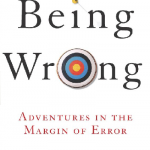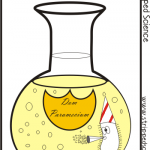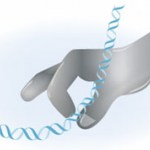
A new paper in Science describes the discovery of a fundamentally new carbon cycling pathway in an extreme salt-loving archaea. Check out this summary of the paper for a quick morning microbe fix. I have to read the paper carefully myself before I can really talk about it, but I did want to share this right away.
Mark Henderson of The Times is embarking on (what I think is) a great project - highlighting the contribution that the science savvy can have and are having on public discourse.
The intersection of science and politics is a growing interest of mine, though I don't have nearly as much credibility as many others around the blogosphere (but give me a break - I'm still in grad school). Go help him out, he wants to know
* What are the best examples of geek activism, what have they achieved and what can we learn from them?
* What else can geeks do to hold politicians and civil servants to…
The heavy hitters in the science publishing business are taking notice.
This critical onslaught was striking -- but not exceptional. Papers are increasingly being taken apart in blogs, on Twitter and on other social media within hours rather than years, and in public, rather than at small conferences or in private conversation.
Like everything else in the modern world, old orthodoxies are going to have to change. I would love to accelerate this process, but it's going to be an uphill battle.
This article in Nature discusses a GWAS (genome-wide association study) that supposedly linked a…
Have you ever been wrong? Well then, this book is for you.
It's a trick question, because everyone is wrong all the time. A more detailed review after the jump, but the bottom line: read it.
I'm barely exaggerating when I say that reading Being Wrong: Adventures in the Margins of Error by Kathryn Shultz should be compulsory for anyone and everyone that ever that has ever thought they know the truth, which is to say everyone. Drawing from history, philosophy, science, current events and a smattering of personal reflection, Shultz takes us through what it means to be wrong, why we get things…
New York Times columnist David Brooks wants to explain away the actions of Jared Loughner, the gunman that shot 20 people at a political event as the isolated actions of a deranged psycho:
All of this evidence, which is easily accessible on the Internet, points to the possibility that Loughner may be suffering from a mental illness like schizophrenia. The vast majority of schizophrenics are not violent, and those that receive treatment are not violent. But as Dr. E. Fuller Torrey, a research psychiatrist, writes in his book, "The Insanity Offense," about 1 percent of the seriously mentally…
There's more to learn about the viruses that infect bacteria over at Discover. This time, it's Ed Yong talking about the bits of DNA that can be leftover in bacterial genomes from viral infections, and how they might actually be helping their hosts:
These captives are called cryptic prophages and they can make up a fifth of a bacterium's DNA. Their existence is puzzling. Bacteria are known for having small, streamlined genomes, yet in they have foreign and potentially harmful viral DNA loitering among their genes. Why?
To find out, Xiaoxue Wang from Texas A&M University found all nine…
It might seem strange at first to use reflection on the recent shooting in Arizona to make a point about progressive politics, but it's absolutely compelling. Go read this, seriously:
Instead our shadow in this country is economic greed, and there is a constant pull to unfetter business, to disallow regulation, and to let business do the business of business no matter the social cost. I have no brief against business and economic activity. It is a human thing. It can be glorious. And, it has deep shadows, including the inclination for the rich to simply continue getting richer while the poor…
Lately, I find myself disagreeing with PZ far more than I used to on a number of matters. Today though, I think he's 100% correct:
What we have here is an attempted assassination of a politician by an insane crank at a political event, in a state where the political discourse has been an unrelenting howl of eliminationist rhetoric and characterization of anyone to the left of Genghis Khan as a traitor and enemy of the state...and now, when six (including a nine year old girl) lie dead and another fourteen are wounded, now suddenly we're concerned that it is rude and politicizing a tragedy to…
Thanks to Viktor at StrippedScience for letting me borrow his microbe New Year's cartoon!
Happy New Year! I was catching up on my blog reader and came across the NatureNews top science stories of 2010. I was curious how many of these stories would have something to do with microbes... turns out quite a few do. Of the 12 science news-worthy events/discoveries selected, 3 were directly related: the claim of Arsenic-based life story, the new HIV drug Truvada (including viruses with microbes), and the synthetic genome from the Ventner institute.
In the style of 6 degrees of Kevin Bacon I…
I rely on my phone to keep track of time - I tend to lose/break or cover watches in chalk, but my phone is pretty reliable. But how does it know the time, and how to people keep track of the passing seconds? Find out in this month's SITN Flash.
Last month, the Flash was spintronics, but the latest is atomic clocks:
While atomic clocks are technologically more complicated than the average timepiece, their operating principle is more or less the same - time is kept by precisely measuring the frequency of a signal. Frequency expresses how often a periodic signal repeats itself. In a grandfather…
I was going to leave all the promotion of ZOMGSCIENCE.net, to everyone else, but he (it has to be a he right?) did T-cells:
I like Sci's description best
Is it overwhelmingly informative? Nope. Is it clean and safe for children or work? Nope. Is it massively entertaining?!?! YES!
-----
*I'm not supposed to put expletives in titles anymore or else google gets mad at us
The vermin only teaze and pinch
Their foes superior by an inch.
So, naturalists observe, a flea
Has smaller fleas that on him prey;
And these have smaller still to bite 'em,
And so proceed ad infinitum*:
-Jonathan Swift
Even though I study the immune system, it always amazes me just how many creatures make their living by parasitizing other creatures. It's like the food chain turned on its head. The food chain you probably learned about in school says that many organisms feed on other organisms, which get fed on by others until you reach whatever ultimate predator sits at the top of the food…
Like so many things, the problem is best explained with an analogy. Imagine a car parked in a dark garage (if you're a mechanic by hobby or trade, make it a computer). Someone hands you keys to the car, a flashlight and a piece of metal that she says belongs to a car similar to the one in the garage. Now, your task is to figure out what that the piece of metal is, and what it's for. Replace car with organism, piece of metal with gene and make the flashlight a whole lot smaller, and you have an idea of what biological research is like. For decades, those wanting to study human genes were like…
I'm from California, but this is my third New England winter (though last year doesn't really count since Washington DC and New York stole al our snow). Even I know, this is a really important message:
And the tips for idiots (mentioned at 0:57) are especially important:
- Do not attempt to mow lawn
- Do not eat de-icing salt
- Do not start fires indoors
- If you pee on yourself, change pants immediately [it may start off feeling warmer, but wet cotton = hypothermia - kb]
- Wear mittens
- Snow is cold
- A garbage bag does not make a "great coat"
- Keep icicles out of eyes
Be safe out there…
Bacteria are tiny. Compared to our cells, they can seem insignificant. There are about ten times more bacteria cells in your gut *right now* than there are human cells in your entire body, but they only make up about 5% of your mass. They're tiny, but they're successful - they live in places we can't, they can metabolize things we can't, and they're everywhere. Despite this success, there's some things they don't do, like multicellularity, but why?
PZ has a great review of a recent paper in Nature that tries to answer that question, so I don't need to recapitulate it, but I have just a couple…
As Boston gets buried under a layer of snow (wooo! blizzard!), the the Weekend Review makes a return with one of my favorite topics: gut microbes.
The fields of immunology, microbiology, nutrition and metabolism are rapidly converging. Here we expand on a diet-microbiota model as the basis for the greater incidence of asthma and autoimmunity in developed countries.
Two important advances in the fields of immunology and gut microbiology have emerged in recent years. First, it has been clearly demonstrated that diet has a considerable effect on the composition of the gut microbiota. Different…
Know anything about quantum computing (other than it sounds awesome)? Well, I didn't, until I read the latest edition of the Harvard Science in the News Flash.
Thus far, utilizing charged electrons to make computers has been endlessly fruitful, allowing us to build smaller and faster computer chips. Unfortunately, we cannot continue improving technology simply by scaling down to smaller sizes because we will eventually reach atomic sizes where our devices will no longer function. As we look ahead into the not-too-distant future, we will need to explore new, innovative technologies that go…
A while back, ERV wrote about a rather silly study trying to equate viruses with obesity. I don't have anything to add to that, but I mention it because in that post, she linked to William M Briggs. He seemed to have a pretty good take on that study, and since I wasn't reading any other blogs by statisticians (and know fairly little about statistics), I added the blog to my RSS feed. It soon became abundantly clear that he and I do not see eye to eye on most issues; he seems very conservative, doesn't have a very high opinion of science, and might be a global warming denier (he never comes…
If you've had your head in the sand for the last 2 weeks, you might have missed the story about arsenic in bacteria and the resulting controversy. If you did go read Ed Yong first.
In an editorial published today in Nature, the editors make a similar point to the one I made yesterday, namely that it's hypocritical for the authors of this paper to parade their research in front of the media to great fanfare, and then refuse to respond to legitimate criticism in the media.
In response to the arsenic bacterium claims, bloggers and researchers raised serious and thoughtful reservations about the…
Scicurious has a great post about free will, and how most people think they have more free will than others.
It doesn't matter whether we HAVE free will or not, our daily lives seem to make us FEEL that we have it. We make many decisions, consider many options every day, some big, some small, but in most of them, we feel like we have a choice, and that we are making that choice of our own free will.
But what's funny is that we don't seem to feel that way about OTHER PEOPLE. While we often feel we have free will in our choices, we don't really feel like our friends do.
Apparently this isn't…




